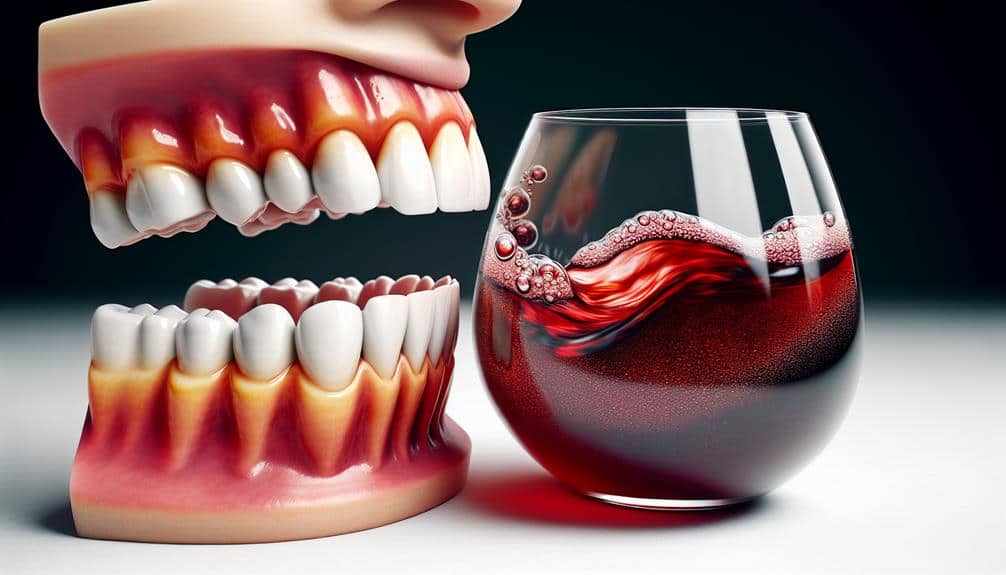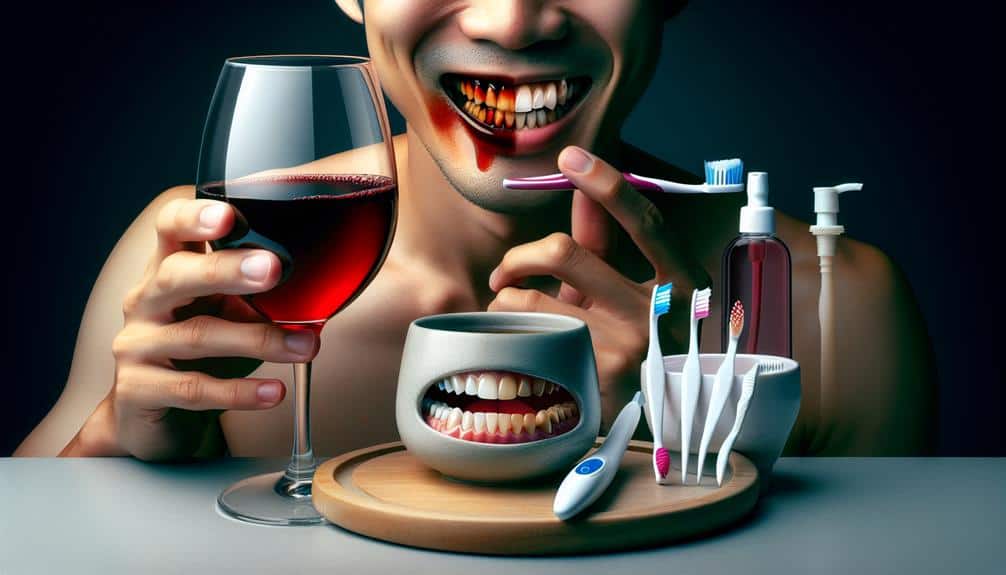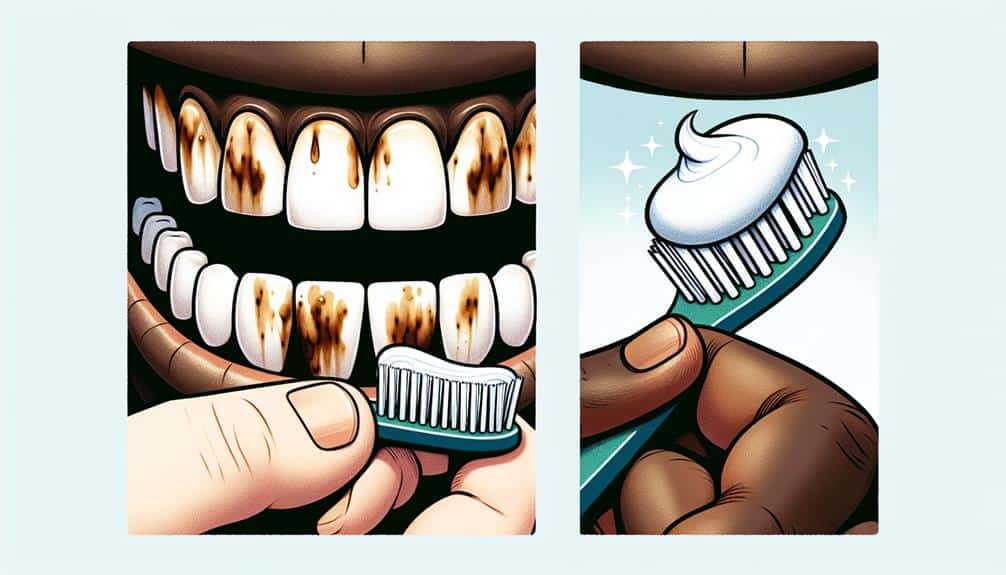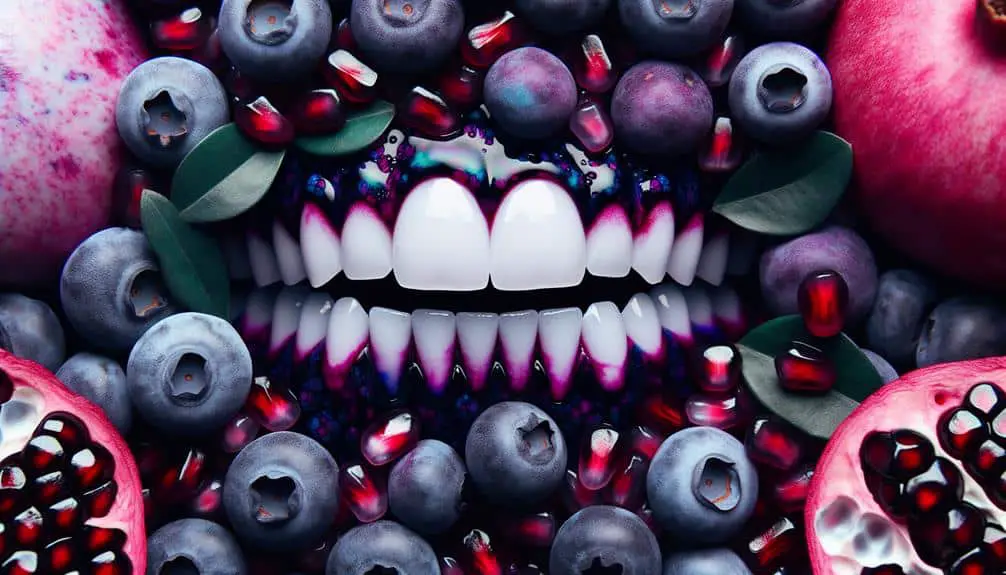Combat teeth discoloration naturally by practicing good oral hygiene habits such as rinsing your mouth with water after consuming red wine vinegar, using a straw to minimize direct contact with teeth, and brushing your teeth promptly. Incorporate natural remedies like using lemon juice or baking soda to counteract stains. These methods can help maintain your dental health by preventing red wine vinegar-induced discoloration.
Key Points
- Rinse mouth with water post-consumption to reduce acidity exposure.
- Use a straw to minimize direct contact with teeth.
- Brush teeth promptly after consuming red wine vinegar.
- Consider alternative options to red wine vinegar to prevent discoloration.
- Stay informed about red wine vinegar's effects on teeth for better oral care.
Red Wine Vinegar and Teeth Discoloration
Combat teeth discoloration effectively by understanding how red wine vinegar can impact the color of your teeth. Red wine vinegar is known for its acidic nature, which can pose risks to your dental hygiene. When acidic foods like red wine vinegar come into contact with your teeth, they can weaken the enamel, making your teeth more susceptible to discoloration and staining. The acidity of red wine vinegar can erode the protective layer of your teeth, exposing the dentin underneath, leading to a yellowish appearance over time.
To mitigate the effects of red wine vinegar on your teeth, it's important to practice good dental hygiene. After consuming acidic foods, including red wine vinegar, consider rinsing your mouth with water to help neutralize the acidity and protect your enamel. Additionally, waiting at least 30 minutes before brushing your teeth after consuming acidic foods can prevent further enamel erosion. By being mindful of your consumption of acidic foods and maintaining proper dental hygiene practices, you can help prevent teeth discoloration caused by red wine vinegar.
How Red Wine Vinegar Stains Teeth
Red wine vinegar stains teeth by penetrating the porous enamel and interacting with the dentin underneath, leading to discoloration over time.
To prevent stains and maintain good dental health, consider the following:
- Limit Exposure: Reduce direct contact between red wine vinegar and your teeth by using a straw when consuming acidic beverages.
- Rinse Thoroughly: After consuming red wine vinegar, rinse your mouth with water to help wash away any remaining acids and residues that could contribute to staining.
- Brush Effectively: Brush your teeth gently but thoroughly with a soft-bristled toothbrush and fluoride toothpaste to remove surface stains caused by red wine vinegar.
- Regular Dental Check-ups: Schedule routine dental cleanings and check-ups to monitor any signs of staining or enamel erosion caused by acidic foods and beverages like red wine vinegar.
Natural Remedies to Combat Discoloration
To address teeth discoloration naturally, consider incorporating simple yet effective remedies into your dental care routine. Two natural remedies that can help combat discoloration are the lemon juice remedy and the baking soda treatment.
Lemon juice contains citric acid, which has natural bleaching properties that can help lighten stains on teeth. To use this remedy, mix fresh lemon juice with an equal amount of water and swish it around in your mouth for a minute or two. Be cautious not to overuse lemon juice as its acidity may harm tooth enamel over time.
Baking soda is known for its mild abrasive properties, making it an effective solution for removing surface stains from teeth. Create a paste by mixing baking soda with water and brush your teeth gently with it for about two minutes. However, avoid excessive use of baking soda as it can wear down enamel if used too aggressively.
Incorporating these natural remedies into your dental care routine can help combat teeth discoloration effectively and maintain a brighter smile without harsh chemicals.
Preventing Teeth Stains From Red Wine Vinegar
To avoid teeth stains from red wine vinegar, it's important to be aware of its potential impact on dental discoloration. Red wine vinegar contains acidic properties that can lead to enamel erosion and staining if not managed properly. Here are some strategies to prevent teeth stains from red wine vinegar:
- Rinse Your Mouth: After consuming red wine vinegar, rinse your mouth with water to help wash away the acid and prevent it from sticking to your teeth.
- Use a Straw: When drinking beverages containing red wine vinegar, using a straw can help minimize direct contact with your teeth.
- Brush Your Teeth: Brushing your teeth shortly after consuming red wine vinegar can help prevent staining by removing any residue.
- Explore Wine Alternatives: Consider trying white wines or lighter-colored beverages as an alternative to red wine vinegar to reduce the risk of teeth stains.
Maintaining Bright Teeth Naturally
Maintaining a radiant smile naturally involves implementing consistent oral hygiene practices and making mindful dietary choices. Natural remedies can aid in keeping your teeth bright and preventing discoloration. Brushing your teeth at least twice a day with a fluoride toothpaste and flossing daily are essential habits to maintain oral health. In addition, using a mouthwash containing fluoride can help strengthen enamel and prevent cavities.
To enhance the brightness of your smile naturally, consider incorporating crunchy fruits and vegetables like apples and carrots into your diet. These foods can help remove surface stains and promote saliva production, which aids in washing away food particles. Additionally, consuming dairy products rich in calcium, such as cheese and yogurt, can help strengthen teeth and maintain their whiteness.
Remember to limit consumption of foods and beverages that can stain teeth, such as coffee, tea, and red wine. By adopting these practices and making mindful dietary choices, you can achieve and maintain bright smiles naturally.
Frequently Asked Questions
Can Red Wine Vinegar Discoloration Be Reversed With Professional Teeth Whitening Treatments?
To reverse red wine vinegar discoloration, consider professional whitening treatments. While natural remedies might help, consulting a dentist for tailored solutions is advisable. Professional whitening can effectively address stains, restoring your teeth to a brighter shade.
Are There Any Specific Toothpaste or Mouthwash Products That Are Effective in Combating Red Wine Vinegar Teeth Stains?
To prevent red wine vinegar teeth stains, opt for toothpaste with baking soda or activated charcoal. Incorporate mouthwash containing hydrogen peroxide for natural remedies. Regular dental care, like flossing and professional cleanings, helps combat discoloration effectively.
Can Consuming Certain Foods or Drinks Alongside Red Wine Vinegar Help Prevent Teeth Discoloration?
To prevent teeth discoloration from red wine vinegar, consider food pairings like cheese or nuts to counterbalance acidity. Natural remedies such as consuming crunchy fruits and vegetables can help scrub away stains and promote saliva production for protection.
How Long Does It Typically Take for Red Wine Vinegar Stains to Set in on Teeth?
Typically, red wine vinegar stains can set in on teeth fairly quickly, starting to show signs within minutes to hours. To prevent this, consider natural remedies like swishing water after consumption or brushing teeth promptly.
Are There Any Specific Dental Procedures That Can Help Remove Stubborn Red Wine Vinegar Stains From Teeth?
To remove stubborn red wine vinegar stains from your teeth naturally, consider using home remedies like baking soda or hydrogen peroxide. Preventive measures, such as rinsing with water after consuming acidic foods, can also help maintain your dental health.



